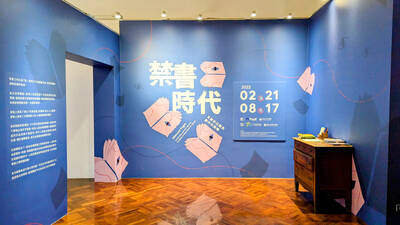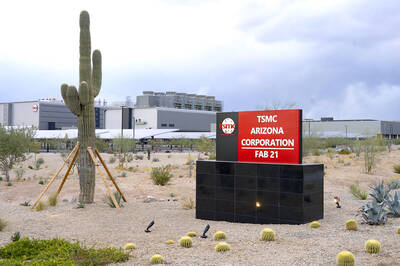William Lai’s (賴清德) mother was bitterly disappointed when the Harvard-educated doctor told her in the 1990s that he was giving up his medical career to enter politics.
She might forgive him now: As Taiwan’s vice president, Lai was yesterday named as the Democratic Progressive Party’s (DPP) candidate in next year’s presidential election, a vote being watched more closely than ever from Washington to Beijing.
With US-China tensions increasingly centered around Taiwan, the winner of next year’s January election will immediately step into a role that could determine the trajectory of geopolitics and the global economy for years to come.

Photo: AP
Since taking office in 2016, President Tsai Ing-wen’s (蔡英文) rejection of the idea that Taiwan is just a part of China often drew criticism from an increasingly aggressive Beijing while earning the praise of policymakers from both parties in Washington. Tsai’s recent stops in the US, where she met with House Speaker Kevin McCarthy and was feted at an awards ceremony in New York, underscore the growing strength of US-Taiwan relations.
“I believe our bond is stronger now than at any time or point in my lifetime,” McCarthy told reporters after the meeting, held at the Reagan Presidential Library in Simi Valley, California.
But the US also has uneasy memories of a previous Taiwanese president, Chen Shui-bian (陳水扁), who frayed nerves in Washington with his unpredictable rhetoric and more robust push to cement Taiwan’s de facto independence.

Photo: AP
While Lai, 63, now insists he shares the same stance on Taiwan’s political status as Tsai, arguing that the island is already an independent — although largely unrecognized — country and that there is no need to declare independence, he has generated concern with some of his past comments.
During his time as premier in 2017, he described himself as a worker for Taiwan’s independence. It appears to be a long-held view. During a visit to Shanghai’s Fudan University in 2014, when he was the mayor of Tainan city, he said independence was a consensus view in Taiwanese society, which polls consistently show is true.
Not surprisingly, China has been critical of Lai’s views.
‘ACCIDENTAL’ POLITICIAN
Lai and his supporters say his previous, more-outspoken rhetoric is a thing of the past and that he has grown as a political leader.
“This is not just an election tactic,” said Kuo Kuo-wen (郭國文), a DPP lawmaker known for his close ties with Lai, in an interview. “It reflects that Lai has learned the reality of Taiwan’s international position and the stakes of geopolitical tensions.”
It’s still unclear who Lai could face in January’s vote. The Chinese Nationalist Party (KMT), which favors closer ties with China, has yet to decide on their candidate but says it will do so by the end of June. Currently, Hon Hai Precision Industry Co founder Terry Gou (郭台銘) and New Taipei City Mayor Hou You-yi (侯友宜) are the main hopefuls, according to opinion polls. KMT Chairman Eric Chu (朱立倫) has indicated he doesn’t intend to run in the election but he remains a possible outside contender.
JUMP INTO POLITICS
Lai’s politics and views on Taiwan were shaped by his upbringing. He was born in 1959 into a mining family on the coast of northern Taiwan just outside Taipei. His mother raised him and his five siblings alone after his father died when he was just two years old.
His mother played a key role in his life and career choices, according to an authorized biography. He studied hard to become a doctor, getting a masters degree in public health from Harvard University, in line with his mother’s aspirations for him.
He then defied his mother’s wishes when deciding to ditch his medical career in favor of politics in the mid-1990s. In his official biography, he describes how he was motivated to stand up for Taiwan during the Third Cross-Strait Crisis, when China fired missiles into the sea around the island in 1995 and 1996. His dissatisfaction with the KMT, which had ruled Taiwan since the 1940s, was another motivating factor, he said.
Lai decided to run to be Tainan’s representative in the now-abolished National Assembly in 1996. His mother vigorously opposed his decision to enter politics, only relenting when she determined he had little chance of winning and would be forced to return to medicine.
She was wrong: Lai won, launching what would become a successful political career that he describes as “an accidental journey.” He later won a seat in Taiwan’s legislature and then became mayor of Tainan in 2010.
As mayor, he earned a reputation for integrity. On official trips to Taipei, he would stay at his family’s older, modest home rather than seek out fancier lodging. He doesn’t smoke or drink alcohol and is seen as less social than many grassroots politicians. He’s also renowned for his memory — giving speeches without notes — and for spending time studying US, Japanese and Chinese politics.
2020 CHALLENGE
On the basis of his favorable poll ratings and reputation as a competent administrator in Tainan, Lai was tapped to serve as premier under Tsai between 2017 and 2019.
That relationship fractured in 2019 when Lai quit his post to challenge Tsai for the DPP’s nomination in the 2020 presidential election. Tsai ended up easily beating Lai in the party primary before extending an olive branch by making him vice president for her second term.
People familiar with the situation say there is no lingering animosity between the two now and described them as having a professional and respectful relationship.
As for how government policy would change under a possible President Lai, people close to him insist he will not deviate from Tsai’s current course of strengthening ties with Taiwan’s major democratic partners, such as the US, Japan and Europe. His recent speeches as vice president also reveal a concern about sustainability and Taiwan’s goal of achieving net zero carbon emissions by 2050.
But China looms over it all.
“Taiwan is at a critical moment of survival and development,” Lai wrote in a Facebook post last month, when he registered to be a presidential candidate. “We must continue to strengthen Taiwan, uphold democratic values and ensure Taiwan’s security.”

On the final approach to Lanshan Workstation (嵐山工作站), logging trains crossed one last gully over a dramatic double bridge, taking the left line to enter the locomotive shed or the right line to continue straight through, heading deeper into the Central Mountains. Today, hikers have to scramble down a steep slope into this gully and pass underneath the rails, still hanging eerily in the air even after the bridge’s supports collapsed long ago. It is the final — but not the most dangerous — challenge of a tough two-day hike in. Back when logging was still underway, it was a quick,

From censoring “poisonous books” to banning “poisonous languages,” the Chinese Nationalist Party (KMT) tried hard to stamp out anything that might conflict with its agenda during its almost 40 years of martial law. To mark 228 Peace Memorial Day, which commemorates the anti-government uprising in 1947, which was violently suppressed, I visited two exhibitions detailing censorship in Taiwan: “Silenced Pages” (禁書時代) at the National 228 Memorial Museum and “Mandarin Monopoly?!” (請說國語) at the National Human Rights Museum. In both cases, the authorities framed their targets as “evils that would threaten social mores, national stability and their anti-communist cause, justifying their actions

In the run-up to World War II, Admiral Wilhelm Canaris, head of Abwehr, Nazi Germany’s military intelligence service, began to fear that Hitler would launch a war Germany could not win. Deeply disappointed by the sell-out of the Munich Agreement in 1938, Canaris conducted several clandestine operations that were aimed at getting the UK to wake up, invest in defense and actively support the nations Hitler planned to invade. For example, the “Dutch war scare” of January 1939 saw fake intelligence leaked to the British that suggested that Germany was planning to invade the Netherlands in February and acquire airfields

Taiwanese chip-making giant Taiwan Semiconductor Manufacturing Co (TSMC) plans to invest a whopping US$100 billion in the US, after US President Donald Trump threatened to slap tariffs on overseas-made chips. TSMC is the world’s biggest maker of the critical technology that has become the lifeblood of the global economy. This week’s announcement takes the total amount TSMC has pledged to invest in the US to US$165 billion, which the company says is the “largest single foreign direct investment in US history.” It follows Trump’s accusations that Taiwan stole the US chip industry and his threats to impose tariffs of up to 100 percent